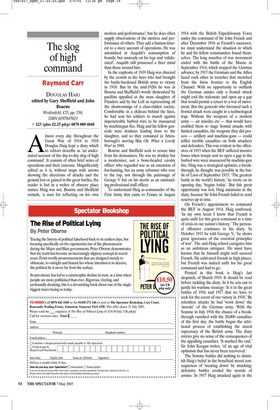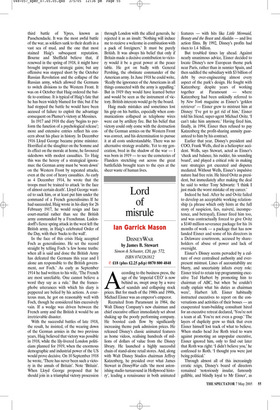The slog of high command
Raymond Carr
DOUGLAS HAIG edited by Gary Sheffield and John Bourne Weidenfeld, £25, pp. 550, ISBN 0297847023 ✆ £23 (plus £2.25 p&p) 0870 800 4848 Almost every day throughout the Great War of 1914 to 1918 Douglas Haig kept a diary which its editors describe as ‘an understated account of the day-to-day slog of high command’. It consists of often brief notes of operations and their outcome. Magnificently edited as it is, without maps with arrows showing the directions of attacks and the ground lost or gained in the great battles, the reader is lost in a welter of obscure place names. Haig was not, Bourne and Sheffield remark, ‘a man for reflecting on his own motives and performance’, but he does often supply observations of the motives and performance of others. They add a human interest to a mere account of operations. He was astonished at Asquith’s consumption of brandy; but unsteady on his legs and ‘exhilarated’, Asquith still possessed a finer mind than those around him.
In the euphoria of 1919 Haig was cheered by the crowds as the hero who had brought the battle-hardened British army to victory in 1918. But by the mid-1920s he was in Bourne and Sheffield’s words ‘demonised’ by pacifists appalled at the mass slaughter of Flanders and by the Left as representing all the shortcomings of a class-ridden society. Comfortable in a château behind the lines, he had sent his soldiers to march against impenetrable barbed wire to be massacred by machinegun fire. Haig and his fellow generals were donkeys leading lions to the slaughter, and so they remained in Attenborough’s moving film Oh, What a Lovely War! in 1969.
Bourne and Sheffield seek to rescue him from his demonisers. He was no donkey but a moderniser, not a bone-headed cavalry officer who regarded war as an extension of fox-hunting, but an army reformer who rose to the top, not through the patronage of George V but on his merits as an outstanding professional staff officer.
To understand Haig as commander of the First Army that came to France in August 1914 with the British Expeditionary Force under the command of Sir John French and after December 1916 as French’s successor, we must understand the situation in which he and his fellow commanders found themselves. The long marches of war movement ended with the battle of the Marne in September 1914, which stopped the German advance; by 1915 the Germans and the Allies faced each other in trenches that stretched from the Swiss frontier to the English Channel. With no opportunity to outflank the German armies only a frontal attack might end the stalemate and open up a gap that would permit a return to a war of movement. But the generals who favoured such a frontal attack were caught in a technological trap. Without the weapons of a modern army — air missiles etc — that would have enabled them to stage frontal attacks with limited casualties, the weapons they did possess — artillery and machine-guns — could inflict terrible casualties on both attackers and defenders. This was evident in the offensives of 1915 when the BEF suffered massive losses when troops sent to open a gap in the barbed wire were massacred by machine-gun fire. Haig was a strategical optimist; a breakthrough, he thought, was possible in the battle of Loos of September 1915. ‘The greatest battle in the world’s history,’ he wrote on its opening day, ‘begins today’. But this great opportunity was lost, Haig maintains in the diary, because Sir John French failed to send reserves up in time.
On French’s appointment to command the BEF in August 1914, Haig confessed, ‘In my own heart I know that French is quite unfit for this great command at a time of crisis in our nation’s history.’ The personal offensive continues in his diary. In October 1915 he told George V, ‘he shows great ignorance of the essential principles of war’. The anti-Haig school castigates him as an ambitious intriguer. He must have known that he himself might well succeed French. He cultivated friends in high places, but French was indeed unfit for his great command and had to go.
Printed in this book is Haig’s last despatch, of March 1919. It should be read before tackling the diary. In it he sets out to justify his wartime strategy: ‘It is in the great battles of 1916 and 1917 that we have to seek for the secret of our victory in 1918.’ By relentless attacks he had ‘worn down’ the ‘morale’ of the German army. With the Somme in July 1916 the chance of a breakthrough vanished with the 20,000 casualties of the first day; the battle began the attritional process of establishing the moral supremacy of the British army. The diary entries give no sense of the consequences of the appalling casualties. ‘It marked the end,’ Sir John Keegan writes, ‘of an age of vital optimism that has never been recovered.’ The Somme battles did nothing to diminish Haig’s belief in the beneficial moral consequences of ‘wearing down’ by attacking; defensive battles eroded the morale of armies. In 1917 Haig attacked again in the third battle of Ypres, known as Passchendaele. It was the most awful battle of the war, as soldiers sank to their death in a vast sea of mud, and the one that most stained Haig’s subsequent reputation. Bourne and Sheffield believe that, if renewed in the spring of 1918, it might have brought important strategic gains; but any offensive was stopped short by the October Russian Revolution and the collapse of the Russian army, which allowed the Germans to switch divisions to the Western Front. It was on 4 October that Haig ordered the battle to continue. It is typical of Haig’s fate that he has been widely blamed for this; but if he had stopped the battle he would have been accused of failure to exploit the advantage consequent on Plumer’s victory at Messines.
In 1917 and 1918 the diary ‘begins to perform the function of a psychological release’; more and extensive entries reflect his concern about his place in history. In December 1916 Lloyd George became prime minister. Horrified at the slaughter on the Somme and its effect on the morale at home, he favoured sideshows with modest casualties. To Haig this was the heresy of a strategical ignoramus: the German army must be ‘worn down’ on the Western Front by repeated attacks, even at the cost of heavy casualties. As early as 4 December 1914, he wrote that the troops must be trained to attack ‘in the face of almost certain death’. Lloyd George wanted to sack him, or at least put him under the command of a French generalissimo. If he had succeeded, Haig wrote in his diary for 26 February 1917, he would resign and face court-martial rather than see the British army commanded by a Frenchman. Ludendorff’s fierce spring attack in the west left the British army, in Haig’s celebrated Order of the Day, with their ‘backs to the wall’.
In the face of this crisis Haig accepted Foch as generalissimo. He set the record straight by telling Foch ‘a few home truths: when all is said and done the British Army has defeated the Germans this year and I alone am responsible to the British government, not Foch.’ As early as September 1914 he had written to his wife, ‘The French are most unreliable. One cannot believe a word they say as a rule.’ But the francophobe utterances with which his diary is peppered are belied by his actions. A courteous man, he got on reasonably well with Foch, though he considered him excessively vain. If a wedge was driven between the French army and the British it would be an irretrievable disaster.
With the successful battles of late 1918, the result, he insisted, of the wearing down of the German armies in the two previous years, Haig believed that victory was possible in 1918, while the lily-livered London politicians planned for 1919, when the enormous demographic and industrial power of the US would prove decisive. On 10 September 1918 he wrote, ‘There has never been such a victory in the annals of Britain’. Note ‘Britain’. When Lloyd George proposed that he should join in a triumphal victory procession through London with the allied generals, he rejected it as an insult: ‘Nothing will induce me to recieve a welcome in combination with a pack of foreigners.’ It must be purely British. It was always his belief that only if Britain made a decisive contribution to victory would it be a great power at the peace table. He got on badly with General Pershing, the obstinate commander of the American army. In June 1918 he could write, ‘Really the ignorance of the Americans in all things connected with the army is appalling.’ But in 1919 they would have learned better and would be seen as the instrument of victory. British interests would go by the board.
Haig made mistakes and sometimes lost his grip on his battles, especially when communications collapsed as telephone wires were cut by artillery fire. But his belief that victory could only come with the destruction of the German armies on the Western Front was correct, and his determination to pursue it at all costs understandable. There was no alternative strategy available. Yet to my generation, bred in the shadow of the war — I was born in 1919 — to see the cemeteries of Flanders stretching out across the great battlefields brought tears to the eyes at the sheer waste of human lives.




























































 Previous page
Previous page